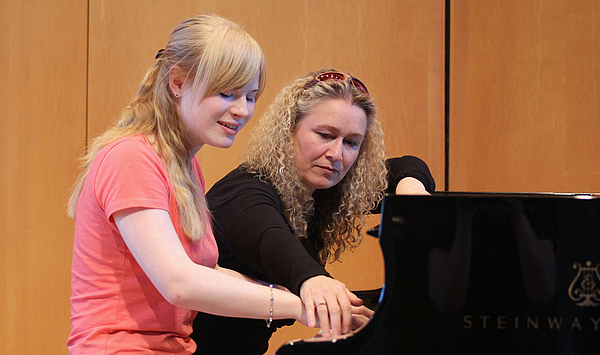
15 years of the blind project
Qualified teacher Viola Michaelis supervises special seminar "Piano lessons for the visually impaired"
A special teaching programme at the Department of Piano at the Weimar Music university is celebrating its 15th anniversary. The so-called "Blind Project" under the direction of qualified teacher Viola Michaelis currently looks after six visually impaired piano students aged between 8 and 39, some of whom are taught at the supra-regional visual support centre in Weimar.
Piano students specialising in instrumental pedagogy regularly sit in on lessons at the Diesterweg School and spend two semesters studying the needs of visually impaired learners.
This special seminar entitled "Piano lessons for visually impaired students" is part of the didactic training of young piano teachers. Professor Bettina Bruhn from Weimar came up with the idea in 2009 and Viola Michaelis has been involved in the project as a teacher since 2011. She gained experience at further training courses, in daily practice and in conversations with blind colleagues and learners, which she prepared for the students.
The teaching material is divided into a total of ten subject areas. As theory and practice are inextricably linked, sitting in on the students' lessons is an integral part of the instruction.
"The piano lessons are not only partly taught in the rooms of the Förderzentrum Sehen, the students can also observe how the school operates here," explains Viola Michaelis. "On the open day in particular, they can experience the world of visually impaired pupils, learn about educational pathways, familiarise themselves with optical and electronic aids for the blind, see teaching materials in Braille and take part in experiments in the dark."
At the centre of the blind project are the piano learners and the acquisition of adequate experience by the students in order to be able to make appropriate didactic decisions in teaching practice. "It is an important goal of the project for the learners to integrate music into their lives, as their leisure activities are naturally limited," says Michaelis. "Creating the conditions for making music in their free time is just as important as the goal of opening up career prospects for particularly talented young people."
Over the past 15 years, a total of around 25 visually impaired people, including visually impaired and blind learners, children with AD(H)S, intellectual disabilities, hearing impairments and speech impairments have been taught. The project is now also part of the Inclusion Network Thuringia (VdM).
[12 July 2024]
